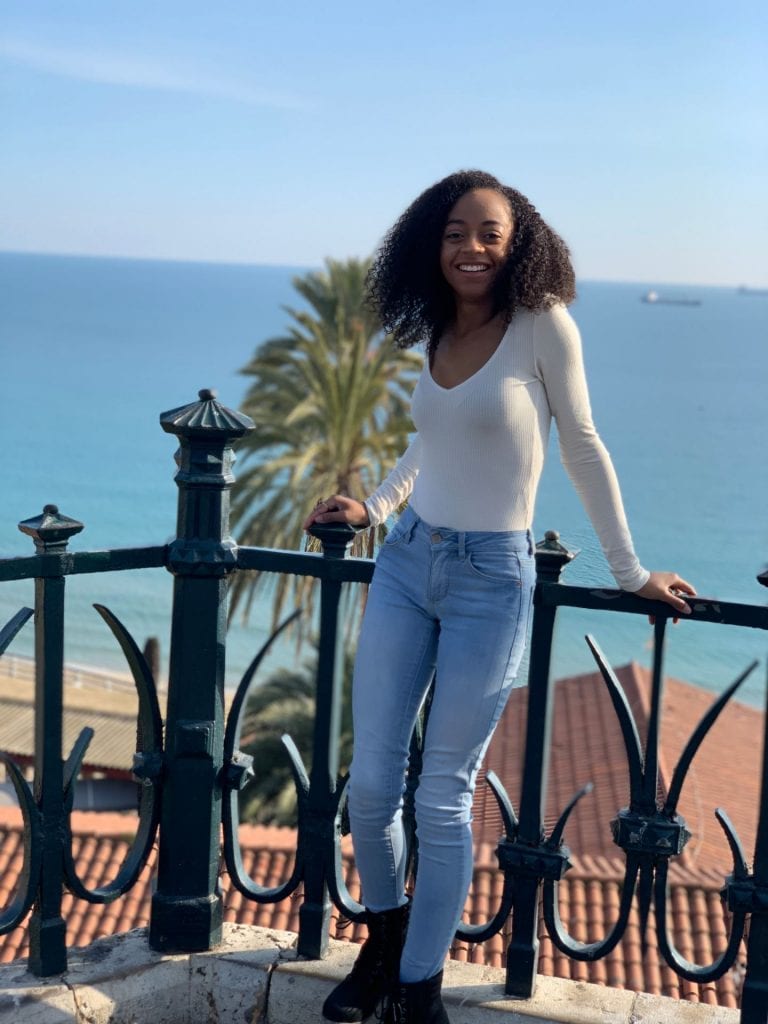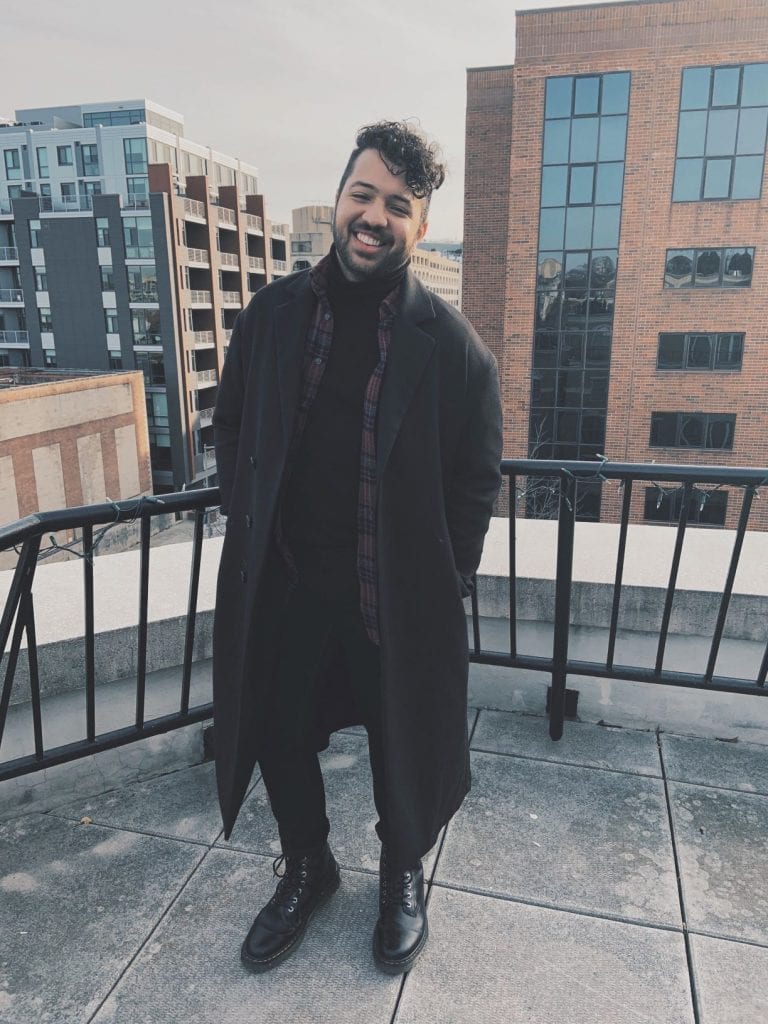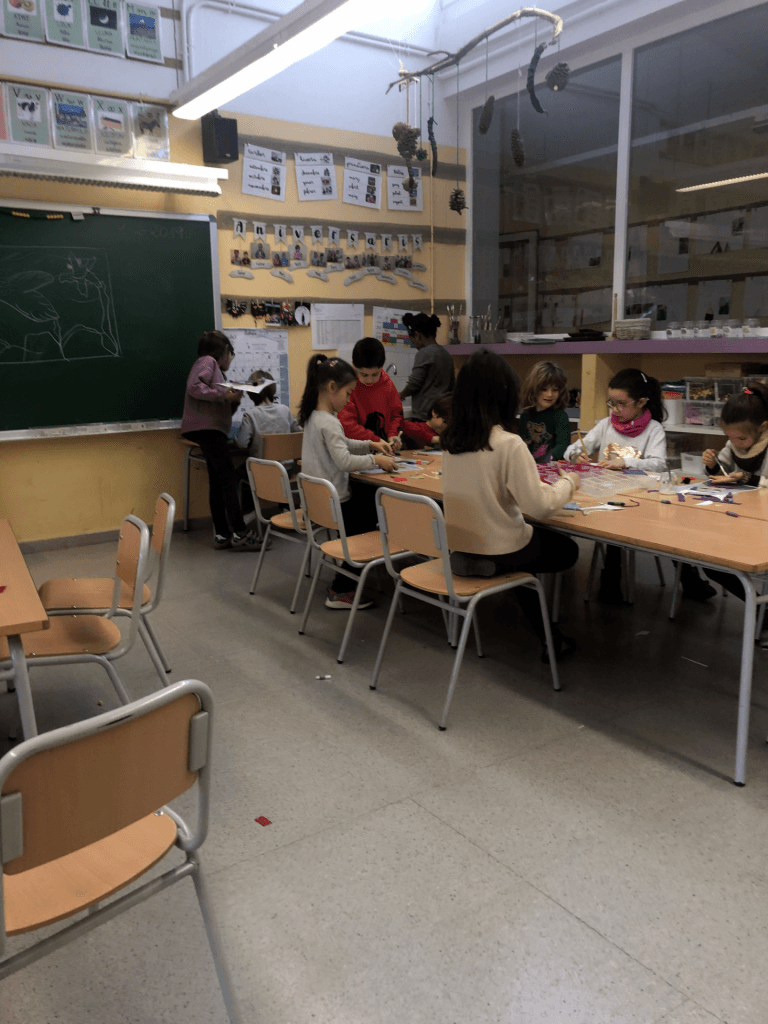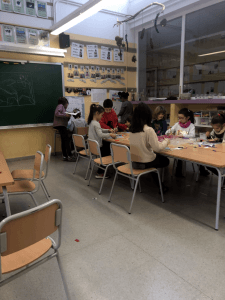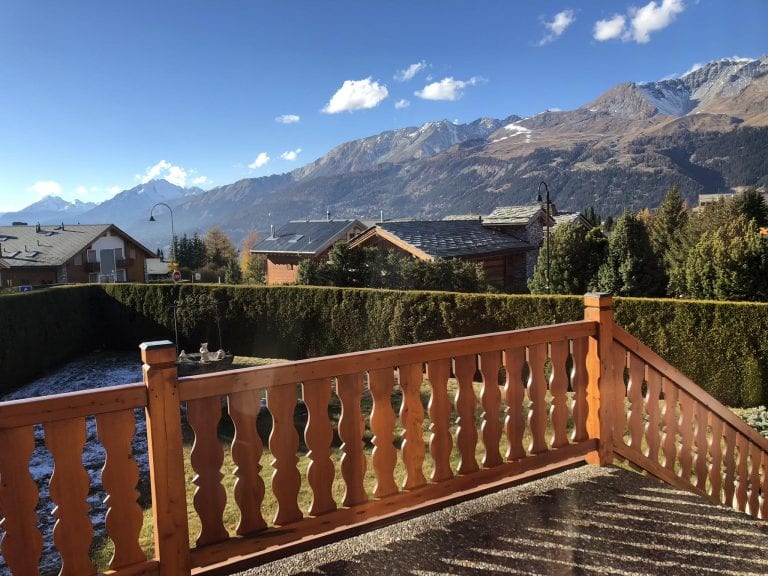I am officially back in the United States and all I can think about is the home and life that I created in Barcelona. Being back has been different, and I feel as though there is a lot to be done, but I am still trying to get through the clutter of jet lag and figure out where to start. Processing this entire experience has been hard, especially with these last four months feeling so unreal. I've spent the last four months volunteering with kids who know nothing about the world I come from, and some of them could hardly even imagine it. I go to an amazing university and have always prided myself on being smart, so it was incredibly humbling to meet 4 and 5 year olds who can speak 3 languages, meanwhile I'm still trying to perfect my Spanish, which I have been learning since elementary school. While abroad, I am so proud of myself for overcoming the language barrier. My Spanish has gotten so much better, and after awhile, I was no longer afraid to just put myself out there and try to talk. I feel like I learned so much more by just trying, even if what I was saying did not come out perfectly. When I get back to GWU, I do want to continue this kind of work and service, so hopefully I am able to find some type of volunteer work with kids that will work with my schedule. Barcelona taught me so much and it gave me so much, and I can't wait to give back.
Tag: Europe
The Final Stretch
My time abroad is quickly coming to a close and I am feeling very confused about it. I am excited to be returning home to my friends and family, but I am already missing the home that I have created and found here in Barcelona. Volunteering has helped me see Barcelona from a different perspective, and although my schedule with classes can be hectic, I love being able to squeeze in the time to do something that matters to me. Studying abroad is a privilege, and I live in a country that has created walls and boarders, blocking people from the opportunity of creating better lives for themselves, and here I am, in Europe, in a different country nearly every weekend. This experience has been eye-opening and has truly made me face privileges that I was not even aware that I had. I am proud of acknowledging that because in a world where I constantly feel as though I am a minority and I know the struggles that I face because of that, I had to step back and realize that there are people who really do have it worse than me, and that there is so much for me to be grateful for. I feel like working with these kids has shown them that the oh so amazing life that I live in America is not far off from theirs, and that if I am able to do something like study-abroad, they can too. Volunteering has greatly enhanced my study abroad experience because it put me in a position to interact as a local, not just a tourist. Volunteering placed me into someone else's world, and it gave me an opportunity to see life from their eyes. Although my study abroad program is not over quite yet, one way that I plan to continue showing my commitment to my community is by helping other students from backgrounds similar to mine realize that studying abroad is something that they can do, and helping them achieve that.
I Am More Than My Resume: Finding Friends and Myself Across Europe
People always think it’s funny when I bring it up, but I cannot stress enough how different of a person I am now than I was during high school. Like, complete 180º different. Going away to college didn’t just give me a chance to meet people outside of the small town I grew up in, but it also affirmed and challenged different parts of my identity that I didn’t even know were possible. It’s been a long process of coming into myself (and it’s not done), but I have been more in tune with my communities and identities in a way that I had never had before college, and in a way that set me up for an abroad experience.
Many people say that going abroad is a chance to “find yourself.” And, in many ways, I believe that this is true. Spending time in a community that is outside of what you are used to makes you think more critically about how you walk through the world. But there’s also the importance of the period before going abroad that is very important in accessing your identity. Doing a self-inventory before I went abroad was a very important part of putting me in the right mindset to travel and live in such a different space. The communities and bonds that I left behind in DC for the semester have been very important in understanding how important a support network is for me. There is a necessary labor that happens in building a space for yourself, and it is so important to have that space in order to be safely challenged and continuously grow, knowing that you have people around to catch you if you need it.
One of the biggest culture shocks for me since going abroad has been the intense paradigm shift in identifying with the work that you do. In the US, it is a given that your identity is constructed by what you spend the majority of your time doing (perhaps work or school). It’s not uncommon to meet someone for the first time and be asked the age-old question: “So what do you do?” It has been so ingrained in my mind that I began to also identify with whatever job I was doing, or even what courses I was taking. In Europe, the idea of identifying yourself first as your career or job is so foreign, that often it doesn’t even come up in conversation until much later in knowing a new person. Actually, I couldn’t even tell you the jobs of most of the people the people that I’ve met so far in my travel experience. It just simply isn’t as important. And the reason I bring this up, is because it has made me consider my identities even more (ironically). People don’t ask me what job I’m working or what internships I’ve had, but they do ask about my family, my hobbies, and my passions. In this way, I’ve been able to actually take more ownership of my identities because of how much more they mean in this cultural context. People ask because they want to know, and I’ve become prouder to share these parts of myself that previously might have been secondary to whether or not I’m working a “hillternship.”
I’ve seen some beautiful places and met some amazing people, and each part of this experience has been a way to both affirm and safely challenge how I walk through a space. That is not to say that you *need* to study abroad to get out of your comfort zone, but sometimes you need to peek over the other side of the fence to see something new in the world and in yourself. Expanding your mindset, and also your community, gives you a space to become more of yourself than you ever thought possible, and in the best cases, gives you people to always fall back on no matter the circumstances.
Gracias!
New Identity in a New Language
By Dom Reynoso
Over the past few years since moving away to college, I have been on a journey of discovering how my different identities and parts of myself interact with each other. I typically identify myself as a Latinx gay man, which are two identities that have combined and contradicted each other throughout my entire life. It has led to a lot of confusion growing up, and it has been an experience of slipping through the cracks. I’m not always seen as “Latinx enough” to operate in those spaces, and at times not “queer enough” to operate in queer spaces because of my race. I think it comes from the reality of how our communities are represented and marketed to the world. When I’m at home in the US, it’s often a struggle to express my identities to people in a way that doesn’t detach them from myself. People typically want an explanation that is coherent with their perception of the world; they want an explanation of “Latinx” that sounds like what they’ve seen in the movies, or a definition of “queer” that can be explained to them without their discomfort. As you can imagine, it makes it difficult to parcel myself out in this way and explain my identities so that they feel lived-in instead of hollow.
Pride in identity is something that I have been challenged with since coming to college. Before that, I had never understood that I could express pride in something that wasn’t normative. And, when I grew to love and express my identities in college, I think it sometimes confused some people. It evoked a sense of disruption when I talked about the intersections of my identities around people who didn’t expect me to. But slowly over time, I got more and more comfortable with the fact that I can claim my identities without shame or fear. Going abroad is such an interesting experience because, in many ways, it is like starting all over learning how to express yourself. What seemed so easy before now exists within the context of an entirely different culture and language. In Italy, people claim their identities in a very different way that continues to change my perception of identity. For many Italians I’ve met, they have a much stronger sense of regional identity than we might find in the US. People classify themselves by their hometown/region first, and then perhaps by being Italian, and in extremely rare cases, as European. It creates a very different aspect of identity than I’m typically used to, but it has a historical reasoning. For many Italians, they remain in the regions that they’re from, and different parts of Italy even speak different dialects (that, according to my host mom, she herself can’t even fully understand when she travels to different regions). This kind of construction of identity is vastly different than what I’m used to, but it is refreshing in the sense that people here are just used to claiming their regional identities more frequently and with more enthusiasm.
It is interesting how a culture and language shift changes your perception of how to think about yourself and the different parts of you that you show to the world. It’s been about a month since I’ve arrived in the country, and I’m surprised everyday about the different things I pick up on. There’s still a lot to be discovered here, and little by learning I’m learning how to define myself again (and maybe this time in Italian).
Work & Play
The Independent Study Project (ISP) is a characteristic element of SIT study abroad programs. During the last third of the semester here, students had the opportunity to conduct primary qualitative research on a topic of their choice. To me, this research period was the most rewarding aspect of my time abroad for a few reasons. Primarily, choosing my own topic, selecting and interviewing renowned experts, and having a flexible schedule to conduct this research were the most enabling elements. Given that this project serves as my senior capstone project, I also devoted a great deal of energy to having my topic be comprehensive and specific to my interdisciplinary interests. Because the specific program I pursued is based in the highly international arena of Geneva, I had the opportunity of interviewing experts who work at the United Nations, World Health Organization, the Institute of Global Health at the University of Geneva, and many other highly esteemed institutions based in Switzerland. Making professional connections and building my network were two wonderful outcomes of this research. My favorite interview opportunity came up through a reference from my research advisor. For this one, I was able to travel to a beautiful town called Crans Montana in the middle of a Swiss valley. This was my first time conducting formal interviews for research purposes and I’m pretty sure I set high expectations for future research because of these amazing opportunities to explore. And while there are opportunities to conduct independent research back in the States, there was great balance of structure, guidance, and freedom during the ISP period, not to mention the centrality of expertise in Switzerland. All in all, the opportunities that have emerged this semester for both personal and career development were, at minimum, incredible. There were many challenges along the way including but not limited to non-response and balancing recreational time. Now that I’m on the other side and have presented my research to my peers and advisors, I have important lessons that I will be taking forward into my career as an aspiring physician.
Some day soon, Maastricht
Finals week is here, and I think I’ve mastered the intersections of procrastinating and study abroad. While my peers are in Maastricht (like responsible adults), I’m back in Italy, avoiding my final papers and snacking on Panettone! Call it irresponsibility or just plain crazy, but if I’ve learned anything in the past few months it’s that you CAN travel around and still pass your classes!
That being said, it’s difficult knowing that in a month I’ll be leaving all of this — the spontaneous travel, the amazing food, and Maastricht— behind. I miss GWU, and I miss D.C., but I’m not really ready for the impending judgmental looks when I ask for mayo on my fries.
Study abroad is a lot of things. It’s putting yourself in a whole new, unfamiliar environment, oftentimes where people don’t speak the language or don’t know your culture. It’s experiencing new flavors, meeting new faces, and trying things you never thought you’d try before. It’s oftentimes lonely, oftentimes sad, and oftentimes exciting and happy. There are moments where you sit in your room, wondering why you came here and wishing you were back at Crepeaway. But there are also moments where you look out across the river and think, “By God, I’m actually here.”
The most amazing part of this experience, though, has been my own personal growth. With so much time by myself, I had to become more comfortable and assured in my own body. Over these past four months, I had a lot of time to think about my past, my future, and how that affects my present. I’m much more confident, much more able, and much less willing to deal with things I don’t find of value. Maybe the Dutch bluntness rubbed off on me, or maybe traveling alone just caused this. But I doubt I’ll have trouble speaking up in class, or voicing my opinions to my friends come second semester.
I’m lucky because I have another month left in my apartment. I still have time to visit Eindhoven, Groningen, the Hague, Rotterdam, Berlin, and all the places I wanted to go but didn’t have the time in the beginning. But I can’t say that I’m not ready to go back. It’s been a fun experiment, but I miss the ole U.S. of A. Of course, I’m sure I’ll feel that way about Maastricht in four months.
Au revoir, Suisse
Last week, we submitted our big independent study projects and I can safely say everyone in our program looks incredibly relieved. The whole month of November was dedicated to research and it has finally come to an end. While the whole process was very rewarding, it was a new kind of challenge I hadn’t had to navigate before. While abroad, the academics have not been as rigorous as they are on campus. I found that balancing independent research and this flexible time period was a challenge that resembled student life for me back at GW. This time frame pushed me even harder to establish a temporary balance between research and leisure because there was still so much I wanted to see and didn’t get to earlier in the semester. Now, we’re in our presentation period and learning about each other’s presentations. It’s truly incredible to hear from my peers researching and pursuing their passions. I’m very pleased with the way the directors of this program organized presentation period because it allows students to showcase their wealth of knowledge on incredibly interesting topics that I would have not otherwise discovered. This does, however, mean that the program is coming to an end.
Saying goodbye to Switzerland is definitely going to be bittersweet. I’ve had an amazing semester abroad here and feel like I’ve made the most of all this country has to offer. Sure, the cost of living here is astronomically high, but there are ways to make it work while still having fun. I have met incredible people abroad and I look forward to keeping in touch and planning visits with them. The bonds we have been able to establish on such a short timeline are at a level I did not anticipate coming into the program. Traveling and studying abroad with my friends has only brought us closer and I can only wish everyone has the privilege of experiencing the wonders of friendship abroad. That’s not to say I don’t miss my friends back home. I think of them every day and we have kept in touch as much as our schedules have allowed. We count down the days and brainstorm all the things we’re going to do when I return.
It feels like it was just yesterday that I was meeting other students at the Nyon hostel for our orientation. Yet here we are… traveling, singing, dancing, laughing with and supporting each other. Soon, we will go our separate ways and back to the lives we temporarily left. I am both excited and nervous for the transitions of readjusting to DC life. One thing’s for sure though and that is I am forever grateful for the love, mentorship, support, and friendship during my time abroad and seek to carry these warm memories wherever my next adventures take me.
Até Já
By Chizuru Uko
Since I got back from fall break Lisbon has started to feel like home, I find myself falling into a routine here and working towards set goals. While I was away I missed a sense of home because I visited so many places and bounced from hostels to staying with friends.
It is also a bitter-sweet feeling because it is my last month in Lisbon and I am not ready to leave Portugal but I am also excited to get reconnected with my family and friends in Nigeria. I am in Nigeria only twice a year and miss being around the people I love so much. I think going to London and getting a little of the warmth and familiarity of home and travelling with my Nigerian friends also made me miss it more. However, I am very grateful for all the lifelong friends I have made here and for the experiences and actually chose to extend my time in Portugal by a week.
I am becoming so much more appreciative of the little things like having conversations with locals in Portuguese and getting to familiar places through muscle memory. Lisbon will always be a special city in my heart, I hope to be back here and spend more time here, also hoping I remain disciplined with Portuguese after Lisbon. Até já.
Eén niet zo goed portie van Sinterklaas
Around this time of year, my parents normally send me one simple text message for the holiday season: “email me what you want for christmas so I can order it on time.” It’s rather straightforward, and indeed a little bit abnormal, but provides the best representation for how my family views the holiday season. Specifically: we’ve never really been big fans. It’s not that we don’t celebrate chirstmas, but the only holiday tradition that avoided falling to the wayside was our visit to a family friend’s christmas party. OF course, that fell apart this year, when my parents traded out California’s great, smokey sunsets for the slightly less smokey sunsets of Oregon. We just don’t “do” christmas well.
In contrast, the minute mid-November hits, the Dutch enter a holiday frenzy. The streets are decorated with intricate, twinkling lights that illuminate the cobblestone and symbolise the welcoming of the new season. Beginning in mid-November and lasting through the first week of January, Dutch city centers and squares are transformed into Christmas markets. Each town has their own unique array of edible goods and non-edible gifts, ranging from scarves to rubber ducks to kettlekorn to loempia. Maastricht even has it’s own ice rink and Ferris wheel!
While the Christmas markets bring together the dutch, in recent years, the holiday season has been marked by a debate regarding one controversial holiday figure: Zwarte Piet. For those of you who don’t know, Zwarte Piet, or “Black Pete," is, explained in simplified terms, the dutch’s racist answer to Santa’s little helper. In more detailed terms, the Dutch Christmas holiday focuses not on Santa, but on Sinterklaas, or Saint Nicholas. Instead of having multiple “elves" who help him deliver presents, he has multiple helpers, who undeniably look a lot like racist caricatures of black people. Piet has an afro, a black (literally black) face, and large, red lips. Beyond that, Piet also wears “moorish” dress, based off of 16th-century noble attire, and a single earring. Zwarte Piet originally was portrayed as an unintelligent helper, however, since the 19th-century origins, he’s now grown into just a lovable, absent-minded character.
And oh boy, do the Dutch love him. Zwarte Piet is inescapable. He’s there, staring at you while you walk from class to class, peering out of the windows of hairdressers, children’s toy stores, and coffee shops. Furthermore, people love to dress up as Zwarte Piet for part of the holiday—donning wigs and drawing on big, red lips on top of blackened faces.
As an American, this holiday tradition scares me. It’s made me feel lucky to live in a country where the work of black civil rights leaders have changed the norm so blackface is, for the most part, unacceptable. You, for the most part, won’t get egged for calling some frat boys interpretation of Kanye West racist—rather, it’s more likely that that frat boy will be fired from his job.
The Netherlands is something else, completely. As of 2018, 88% of the Dutch public did not perceive Zwarte Piet as racist or associate him with slavery. While interpretations of Zwarte Piet now include just rubbing coal on your face, the fact that the character is so widely accepted represents a larger issue with Dutch society. It’s something I’ve noticed while living here, especially when visiting museums or talking to other university students about problems within American society.
While racism and sexism are something that people in America openly talk about, Dutch people just don’t really do that. The reason for this boils down to how we view multiculturalism in our construction of nationalism. In America, multiculturalism is relatively good. We’re the melting pot; our differences boil together to make the cheesy, artificial goo that is America. In a way, this recognition of multiculturalism allows us to talk about our differences. We’re not perfect, and we have a lot of problems, but we do have a large, multi-varied, and constant discourse regarding these problems.
Europe in general views multiculturalism as "niet zo goed." The concept of sameness is intrinsically linked to the concept of equality — you become equal by being the same. But that emphasis on sameness doesn’t create equality—it just tries to pave over the impavable, and by doing so ultimately reinforces problematic power structures and denies social progress. SO, although some of the Dutch I’ve met have claimed they “don’t have racism, unlike America,” my response has always been “you do, but you don’t talk about it.”
One of the easiest ways to see this, outside of but connected to Zwarte Piet, is through how various museums address colonization. While the Dutch may not have dealt with the civil war, the Dutch have had a long history of colonization and enslavement. They were heavily involved in the slave trade, shipping kidnapped African people to Spanish colonies in Brazil. They colonized South Africa and the East Indies, murdering indigenous persons and forcing enslaved Africans and Pacific Islanders to the same horrific treatments that Black Slaves in America had to deal with. And Zwarte Piet is undeniably connected to this history—he is, no matter how the culture tries to gloss over it—Santa's slave, not helper.
My interaction with the Dutch education system is limited. But based off of what I know from visiting museums, the history of colonization is portrayed as a “G” rated joke. Stolen objects and dioramas of apartheid settlements and Indonesian sugar farms are encased in glass, next to descriptions that avoid addressing the kind of orientalization and dehumanization that accompanied the actions. Importantly, Black and indigenous perspectives are missing from these narratives—rather the narrative acknowledges some bad stuff happened, but it’s ok because that was a while ago. Tackling this history means avoiding the white-washed, G-rating. And effectively tackling gives everyone the basis to have an easier discussion on Zwarte Piet.
There are a plethora of other issues Zwarte Piet symbolizes, importantly including the removal of voices of color from Dutch discourse. And, indeed, it’s by centering these voices of color and acknowledging difference that the Dutch can actually begin this process. That might start with museums, or it might start with the education system—as some Dutch teachers are already doing. But either way, white Dutch people need to listen to the people of color who’ve been angry with Piet for decades. The racism needs to be addressed, and Zwarte Piet needs to go, soon.

